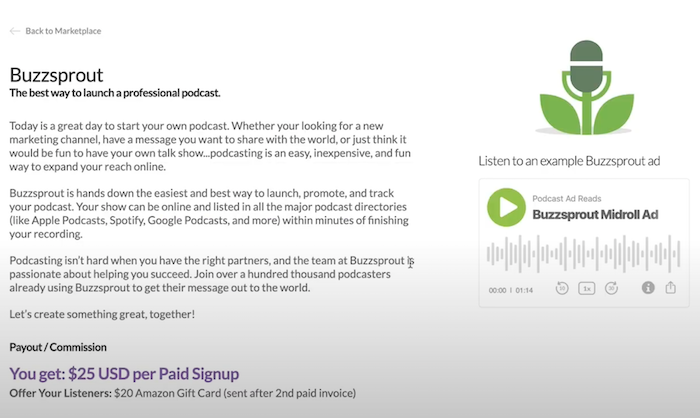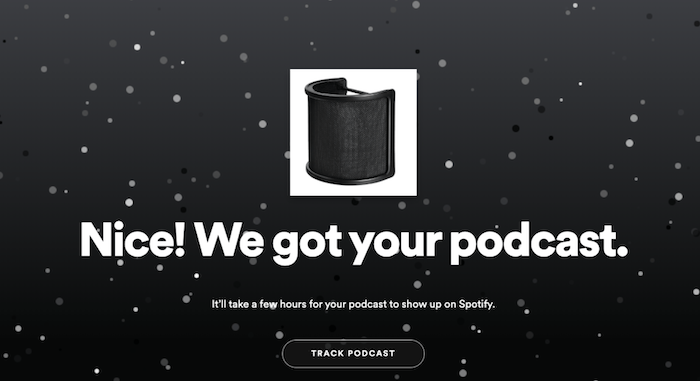The way to Get Podcast Sponsors
Let's face it: it's difficult to make a podcast. Considerable effort is required from creating content to editing it.
Wouldn't it be great if you could get paid for all of this hard work? You can if you get podcast sponsors.
With the help of a podcast sponsor, you can monetize your show, expand your platform, and most importantly, build long-term relationships with various brands. Below, I'll show you how to find potential sponsors and walk through some best practices for using sponsored ads in your podcasts.
How do podcast sponsorships work?
Before looking for your first sponsor, you need to understand how podcast advertising works.
Ad format
A podcast sponsor or advertiser pays you to promote their goods or services through one or more podcast episodes. You are free to get a little creative. Typically, hosts can serve ads in two ways: radio-style or host-reading.
Radio style ads
With this format, a third party marketing company creates the ads and you place them somewhere in your episode. Is it effective? According to Edison Research, 70 percent of listeners view a product after learning about it on a favorite podcast. So yes!
Some podcast sponsors only work with hosts who run radio-style ads.
Host read indicators
Instead of inserting an ad, talk about the product or service and why it works for you. It's up to you to add the narrative. Just make sure it sounds natural and flows well.
This is the most popular option, accounting for over 63 percent of podcast ads.
Regardless of which option you choose, there are three places to consider where you want an ad to appear:
- Pre-roll: just before the show starts
- Mid-roll: somewhere during the episode
- Post roll: after the show
Sponsorship model
Next, you should choose your sponsorship model: CPM, Affiliate, or Value-Based.
CPM
With CPM or "Cost Per Mille" you get paid for every 1,000 downloads. Here's an example:
- Your sponsor pays $ 20 for every 1,000 downloads (you can average between $ 10 and $ 50, according to HubSpot).
- People download your show 100,000 times.
- You will earn $ 2,000 for this episode.
The problem? This model is best for large shows. Many sponsors do not work with small to medium sized podcasts using the CPM model.
Partner model
With some brands you can register as a partner. You get paid whenever a listener buys the products you are promoting.
On the plus side, there is flexibility about how often you advertise the product and there is no limit to how much you can make.
The disadvantage? There is no guaranteed income and you might not be earning anything. Affiliate marketing doesn't work for everyone.
Value-based sponsorship
Are you a small to medium sized podcast? Value sponsorship could be a good option for you.
Unlike CPM, you don't get paid by the number of downloads. Instead, you negotiate a set price with the sponsor (e.g., $ 50 per episode). It doesn't matter how many downloads you get: you won't make more (or less) than $ 50.
Of course, it's not a great model for large shows with high download rates, but it could be great for smaller or niche podcasts.
Benefits of Podcast Sponsors
Why should you be tracking sponsors in the first place? Podcast sponsors offer several benefits, but here are the main ones:
Monetize your show
Podcast sponsors can help you turn a hobby into an income-generating business.
Think of it this way: over two-thirds of listeners trade from the ads they hear on podcasts. Pretty impressive number, don't you think?
Remember, when listeners take action, you make money.
Build brand identity
With over 850,000 podcasts, if you want to build an engaged audience, you need to find a way to stand out from the crowd. How do you do that? Build a strong brand identity.
Here's another point of view: About three-quarters of Americans listen to podcasts to learn new things. Provide them with meaningful content (and targeted, useful product ads) and they're more likely to come back.
Build a network
The host-podcast-sponsor relationship works both ways. When you promote their goods and services, you earn their trust, which leads to more business or networking opportunities down the line.
Expand your platform
When listeners enjoy your ads, they'll come back to learn more and share your podcast with friends. Over time, some strategic podcast sponsors can help you generate traffic and grow your audience base.
While I'm not suggesting that you use sponsorship as the only way to monetize your podcast, they are certainly a good place to start.
4 strategies for getting podcast sponsors
Here are the top four ways to find podcast sponsors:
1. Contact the sponsors directly
The easiest strategy? Contact potential sponsors directly.
- Research podcasts in your niche.
- Try them out (or listen!) And identify what products or services they are promoting.
- Find out about the company data and look for a contact person.
- Throw them straight.
Don't worry about the pitch yet. We'll look at what to include below.
2. Partner with a hosting service
Podcast hosting services give your podcast a home on the internet. These services allow you to create, manage, and monetize your podcast.
Here are some examples:
- Anchor: Anchor Sponsorships puts you in control of ad placement and the types of ads you serve. This platform is free and could be a great option for new podcasters.
- Buzzsprout: The Buzzsprout Affiliate Marketplace will help you find potential sponsors and get in touch with them. This is a great option if you want to give affiliate marketing a try.
- Transistor: For a monthly fee, you can create and manage multiple podcasts, increasing your chances of finding (and securing) sponsors.

3. Join a podcast network
Some networks allow you to list your show (sometimes for free) on their platform. Potential sponsors browse these platforms and reach out to the shows they want to collaborate with.
This is a great way to get some notoriety. However, if you're a niche podcast or are still building an audience, it might be less effective than other methods. Some networks are difficult to connect, and they often expect a commission cut when paired with a brand.
Still, it doesn't hurt to give these networks a chance. Examples are Wondery and PodcastOne.
4. Use a directory
Don't forget to join the podcast directories from Spotify to Apple Podcasts. That way, there is always an opportunity for you to connect with a sponsor.
Using hosting services like Buzzsprout can help you get listed in the top directories, but they can also get you to the directories you want.
Do your research to find the right directory for your podcast. Here are a few examples to get you started:
- Apple Podcasts
- Spotify
- I was listening to the radio
- turn on
- Google Podcasts

What it takes to get podcast sponsors
Ready to reach out to podcast sponsors? Here are some steps you need to work through before sending your first pitch or reaching prospects:
Know your niche
OK, if you already have a podcast, you already know your niche, right? May be.
I say this because if you don't understand your competition, the answer is no. When examining your competitors, keep the following in mind:
- Listen to podcasts in your industry or industry.
- Take notes on the popular shows. How are the hosts? Why do people love the content? How can you use what you have learned to improve your show?
- If the shows use host read ads, investigate how those ads sound natural. Think about what works and what doesn't.
- Think about where to put your ads. Is it pre-roll, mid-roll, or post-roll? Look for patterns in your niche and follow them if possible.
This is all important data that you can use to improve your show while also finding potential sponsors to pitch it.
Build your audience base
The reality is that approximately 50 percent of podcasts receive fewer than 26 downloads within the first 7 days of being released. This isn't necessarily a bad thing, but it does suggest that the average podcast won't have a huge audience.
Again, not a bad thing. However, the size of your audience will determine which sponsors you will attract and how you can secure them. In other words, large companies are unlikely to sponsor a show with a very small or niche audience.
If you're still growing your audience, consider choosing platforms like Anchor to make finding sponsors easier.
However, if you can rely on your numbers, you may prefer reaching out to individual brands directly.
Present your podcast professionally
The first impression counts. Make sure your podcast is professional enough to attract a sponsor by doing some quality checks:
- Make sure your recordings are clear and free of clutter.
- Always use the best recording device you can afford.
- Check everything you say for facts, unless it is based solely on opinions.
- Put together a media kit to include with your pitch letter or send to potential sponsors.
Learn pitching
Sure, companies want notoriety, which means that they are open to working with podcasters. That means you still have to set up your podcast!
- The whole idea of a pitch email is to start a conversation. Keep it short, concise, and professional.
- First, determine who you are and why you are reaching out to the company about a potential partnership between the two of you.
- Put your show up in a sentence or two.
- If you have a large number of viewers, mark this. Otherwise, add a line or two about why you are contacting that particular company. Why do you think the partnership is a good idea? How will the company benefit from working with you?
- End with an invitation to the company to contact you for more information.
Don't just send an email to a single sponsor. The target group are at least 5-10 sponsors at the same time. You won't hear from everyone and it often takes time to find the right sponsor.
Master the art of follow-up email
Are you still waiting for a reply to these pitch emails? Here are some tips.
- Wait at least two weeks before continuing.
- Politely ask if they had a chance to review your first email and remind them that you are still interested in working with them.
- Do not send more than one follow-up email.
If you still don't get a response, move on to the next sponsor. It takes persistence, optimism, and commitment to attract podcast sponsors. So don't give up after a few no-answers.
Choose the right sponsors
Ultimately, your podcast is about your audience. Without an audience, you can't grow your podcast and you have a hard time getting sponsors.
The problem? The "wrong" sponsors are worse than no sponsors at all. Additionally, some listeners despise ads during podcasts, so there's always a chance you will lose people.
However, keep the following in mind when weighing your options:
- Choose sponsors who are coordinated with the identity of your brand and what you stand for.
- Make sure that the product or service you sponsor is of value to your particular audience. How do you work that out? By running demographic or psychometric profiles.
Don't forget to track your performance too so you know if you are losing, maintaining, or gaining listeners. It can be difficult to pull the audience back when you lose them.
Conclusion
Podcast sponsors can help you monetize your show and turn your podcast business into a scalable, profitable company over the long term.
While sponsorship is great, try to limit your ads to no more than two per show. Too many can frustrate your audience and encourage them to tune out.
Finally, remember that after launching sponsored ads, there is always a chance that you will lose some listeners. But don't let that stop you. Think of this as a calculated risk: Podcast sponsorship can help you develop your channel, improve your brand, and reach more listeners in the long run.
Where can you find podcast sponsors? Did you find it easy to throw them?

See How my agency can drive Firmly Amounts of traffic on your website
- SEO – Unlock tons of SEO traffic. See real results.
- Content Marketing – Our team creates epic content that is shared, links accessed and visitors drawn.
- Paid media – effective paid strategies with a clear ROI.
Book a call
